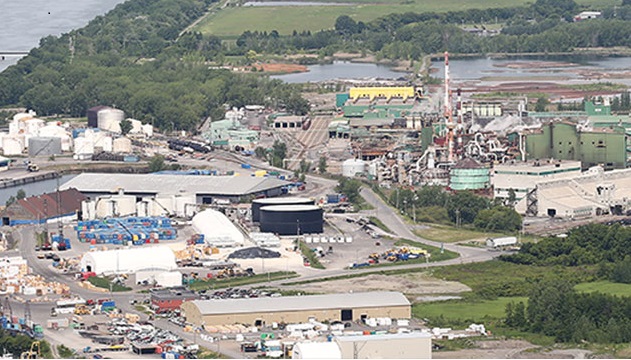After more than nine months on strike, workers at the CEZinc smelter in in Salaberry-de-Valleyfield, Que. have returned to work.
The workers voted 82 per cent in favour of the company’s latest offer on Nov. 25. They returned to work on Dec. 3.
The 371 members of United Steelworkers (USW)/Syndicat des Métallos Local 6486 walked off the job on Feb. 12. On Oct. 2, they overwhelmingly rejected a new contract — voting 97 per cent against the company’s offer.
The refinery, which produces around 265,000 tonnes of zinc a year, is managed by Glencore and owned by the Noranda Income Fund. Around 600 people work at the site, in a town of approximately 41,000, located just west of Montreal.
Workers were largely concerned about company proposals to slash pension plans. There are no cuts to the pension plan in the new six-year agreement.
The contract, which expires on Nov. 30, 2023, also includes minimal pay increases beginning in the second year of the agreement. The only concession was the loss of a vacation premium.
It was important to secure the pension plan for the young workers, said Luc Julien, USW staff representative. About 100 of the local members will be eligible to retire during the length of this new contract, he said. It was important to make sure the younger workers have the same benefits as those who are older.
Keeping the pension plan is a great “relief,” he said.
“We’re pretty proud of our negotiations because we take care of the young people, too,” said Julien, who was a member of the bargaining committee.
But he said it’s frustrating that it took almost 10 months to agree to a contract that’s not too different from the last one.
“We are proud to keep what we have, but we didn’t increase the condition of a lot of the members,” said Julien. “We just fight for keeping (what we had), so there’s a mixed reaction.”
Julien said he’s concerned about what long fights to keep the status quo will mean for younger workers.
“The purpose of bargaining is usually to have more, but now the union just fights hard to keep (what it has),” he said. “It’s sad for the next people in the next generation — always fighting to not have less. What the young people can expect in the next years is they’ll have to do a lot of fight to just keep… what they have.”
The union felt it was important to have all the workers return to their jobs at the same time, said Julien.
“We did the fight all together. We return all together.”
According to Noranda’s website, the refinery contributes to 1,200 jobs in Quebec, making CEZinc the largest private employer in the Salaberry-de-Valleyfield region. The CEZinc refinery is the second-largest zinc refinery in North America, according to Glencore.
Glencore operates zinc mines throughout Canada: the Bracemac-McLeod mine in Matagami, Que., and the Kidd Operation mine in Timmins, Ont. The Brunswick Lead Smelter in Belledune, N.B., processes zinc by-products.
The company used workers hired by sub-contractors several times to staff the site during the strike, the Quebec Ministry of Labour found. Quebec is one of few provinces with anti-slab legislation.
Meagan Gillmore is rabble.ca’s labour reporter.
Like this article? rabble is reader-supported journalism. Chip in to keep stories like these coming.




